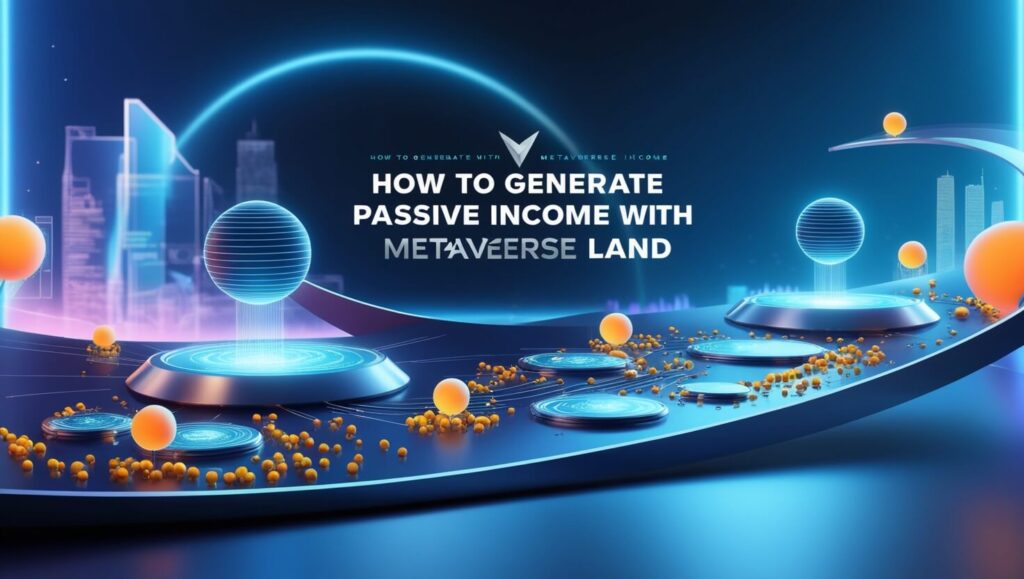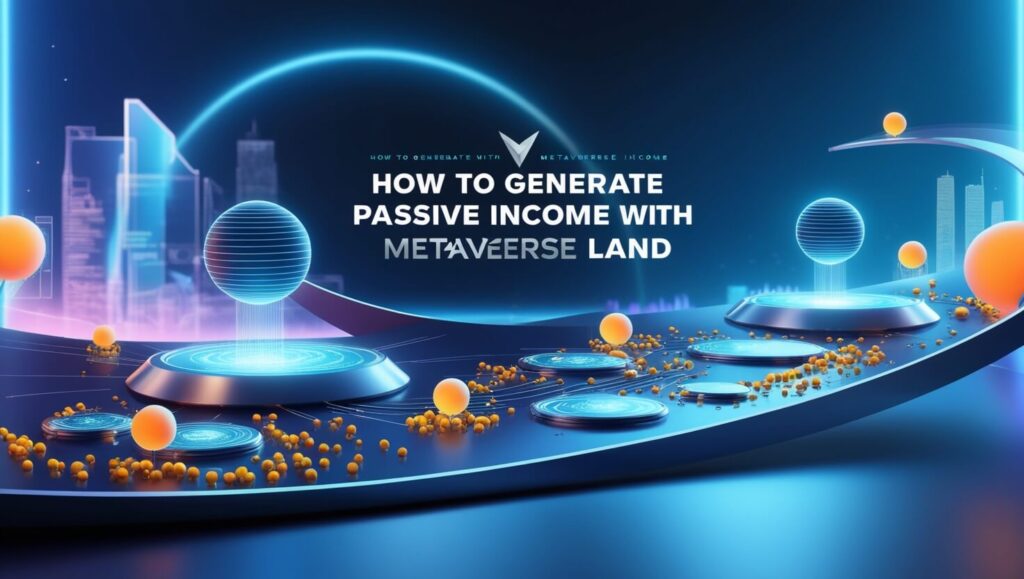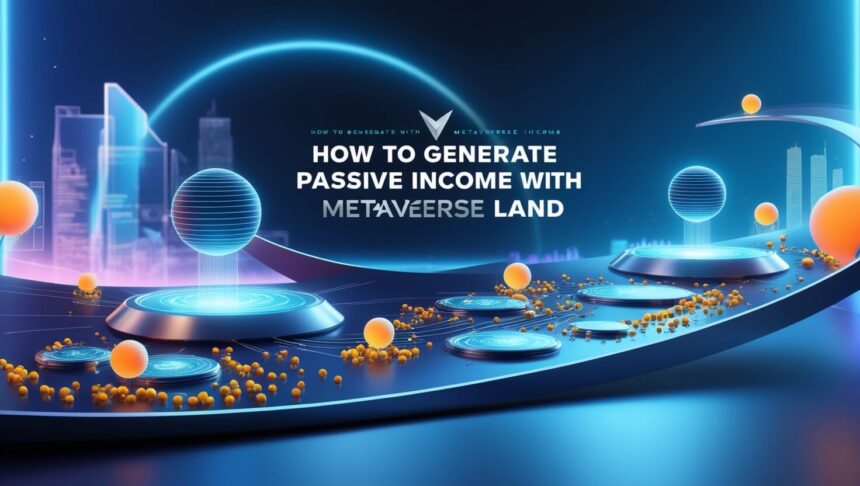In this article, I will talk about How To Generate Passive Income With Metaverse Land. With the growing popularity of virtual real estate, owning Land in Metaverse offers different ways to make money.
From property rentals to event hosting and advertising, numerous opportunities exist for landowners to monetize their holdings and achieve consistent income generation in the virtual environment.
What is Passive Income?
Passive income means earning money with little to no active participation after the initial effort. It usually comes from ventures such as investment, rental properties, royalties, or a business which do not require daily attention after the set up phase.

Some examples are paid dividends from owning company shares, interest from a savings account, and profit earned from e-products, including e-books and e-courses. Even though it oftentimes requires upfront investment of time, finances, and energy, passive income earns one financial security over a given period of time.
How To Generate Passive Income With Metaverse Land

This article explores the strategies that can help earn passive income with land in the Metaverse. With the right approach, your piece of virtual real estate can provide income through various channels. Look at the following ideas:
Renting Virtual Real Estate: Platforms like Decentraland, Somnium Space, or CryptoVoxels allow users to rent out their Metaverse land. Renters frequently seek out prime locations for social or business events, and you can collect regular rental income without any land development.
Building and Renting Houses: Purchase premium real estate, construct virtual houses or commercial buildings, and rent them. These can serve not only as rentals but also transform into offices or even entertainment places, substantially increasing a Streamlined revenue.
Advertising: Let companies promote their products or events on your virtual property. Businesses and brands want to capture the attention of users in the Metaverse, and you can earn by offering them space for virtual billboards, pop-up stores, or other advertising mediums.
Establishing New Economically Beneficial Activities: Within your Metaverse property, consider developing further space for interactive activities such as casinos, nightclubs, or stores. These spaces allow for hosting events or private gatherings which becomes an additional stream of revenue through passive entry and service fees, or rental income.
Leasing Vacant Land: Even without any new constructions, you can generate income by leasing the land to others. A number of people or businesses are willing to pay to access your vacant lot to create their own venture in the Metaverse.
The future of passive income in the Metaverse
The Passive Income Opportunities in the Metaverse In this future, the Metaverse will encapsulate users in a world of AI, AR, VR, and hologram technologies. This will allow users to not only have virtual experiences completely detached from the physical realm, but also boundless transitions between numerous realities.
This shift will benefit all types of organizations and businesses, enabling new forms of earning through passive income. The Metaverse will unlock unprecedented teleportation monetization methods, and adapt traditional Web2 business tactics like spending and earning will inevitably adjust to metaverse concepts.
Selling courses, newsletters, and other digital media are prime examples of passive gaining active income opportunities on the internet which may transform with the metaverse’s arrival. Other concepts like dropshipping, which operates with little owner intervention, will flourish with the e-commerce boom in the metaverse.
Advertising, sponsorships, and social media recommendations are other lesser-known methods of passive income. Once decentralized social media apps fuse with the metaverse, many innovative adaptation of these business methods will come.
Benefits of Investing in Metaverse Land
Value in the Market
The land is valued at a relatively low cost, considering that the Metaverse is still in the introductory phase of capturing public interest. As new users and companies gain access to the virtual worlds, the demand for regionally positioned land is bound to expand further yielding high profits on investment.
Minimal Effort Needed
Income from renting, hosting events, advertising, or even simply owning the land results in passive income generation with little effort required. Such income can serve as a helpful boost to one’s finances in the long run.
Reduced Risks
Simply buying deep in debt gives you a hand in the digital world that stands in stark contrast to more conventional assets. Including virtual properties to one’s portfolio will not only create favorable conditions for emerging digital items, as these tend not to adhere to traditional markets, but it will also mitigate risk.
Businesses in Demand
A plausible way to profit through transactions is by building virtual clubs, stores, or other types of Metaverse land-based businesses compelling users to utilize them, thus creating added income.
Global Reach
Having an internet connection makes access to the Metaverse very easy. So, the virtual real estate you own can get popularity from all over the world. This might prove to be beneficial in various aspects like renting, leasing or even selling your piece of land.
Ownership and Control
Unlike physical real estates, the lands in the Metaverse can be bought just as easily. This enables you to control and develop the land as you feel like for leasing, selling or even just holding on to it giving power over investment choices.
Risks and Challenges

This article shares some of the risks and challenges that come with investing in Metaverse land. There’s always a chance of buying Metaverse land at a profit. However, there are several other considerations to think about beforehand. Some of these thoughts include;
Market Volatility: The metaverse market is relatively new and land within it has a lot of price volatility. Changes in the demand, shifts in the platform, or changes in the user interest can cause significant price swings, making it difficult to predict long term returns.
Regulatory Uncertainty: Like any other, the norms beholding digital property as real estate are still going through their life course. Government controls over cryptocurrency, NFTs, and possessions of digital reality are having an influence and will have a greater influence in the future regarding the impact which could really change the value of the investment.
Platform Risk: It goes without saying that virtual land ownership is usually confined within specific Metaverse platforms like decentrland or sandbox. If users shift from a particular platform or experience challenges of a technical nature, the worth of your land could see a down turn. If platforms decide to shutdown or alter the way they run their business, can jeopardize your investment.
Technological Risks: Failure of blockchain infrastructure or any emerging tech spawned along with the Metaverse can result in critical issues within the platform. The value of virtual land can fluctuate due to software-related issues independent of competing platforms, security loopholes, or bugs in the programs.
Limited Liquidity: In contrast to real estate, selling land in the Metaverse can prove to be challenging as well. Meeting the right buyer at the right price proves difficult due to the demand shortage in the Metaverse real estate market. This makes it highly difficult to sell off investments quickly to achieve liquidity.
Lack of Standardization: The existing policies set forth in the Metaverse are in greater need to be standardized in order to transcend inconsistencies in market navigation due to lack of accurate user protocols alongside ownership and portals across all versions of the Metaverse. Industry interoperability regulations for seamless integration become a must for management purposes.
Owning land in the Metaverse offers one enormous opportunity while having plenty of challenges to overcome. Knowing the risks in investing resources with respect to the trends in the ecosystem helps reduce the overall risk involved to some extent.
Conclusion
Different methods of creating passive income include virtual land in the metaverse. Renting out virtual space, constructing and leasing buildings, selling advertising slots, providing services that yield income, or even leasing raw land can transform investors’ virtual assets into passive income streams.
Beyond the exciting opportunities presented by the metaverse, one must remain diligent and monitor platforms to maximize returns, as there is always risk involved. With the right strategy in place, virtual land within the metaverse can be an asset that yields passive income in the digital economy.









